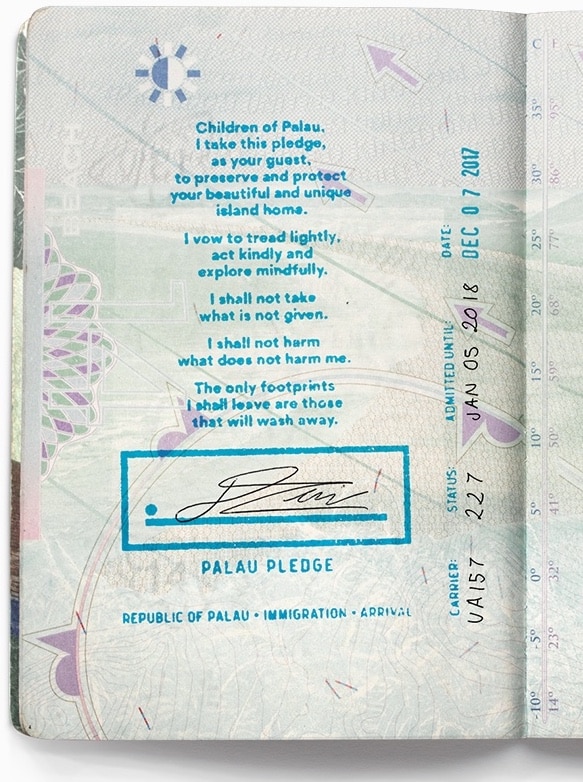The Micronesian nation of Palau has been gaining a reputation not only for trail-blazing conservation measures, reports Tiffany Chan, but also for putting the brakes on irresponsible mass tourism. Now they’ve set their sights on carbon neutrality.

[Above: The Rock Island archipelago, a major tourism draw for Palau. ]
Micronesian Archipelago Leads the Way in Pacific Stewardship
Children of Palau
I take this Pledge
To preserve and protect your beautiful and unique Island home.…
—The Palau Pledge
The tiny island nation of Palau is known worldwide for its marvelous environment – turquoise waters, unexplored lands, biodiversity – and for the innovative regulations that have been implemented to ensure its pristine condition.
This Micronesian country of hundreds of islands, however, has been facing many challenges due to high-volume tourism growth and a dramatic increase in budget-oriented travel. Tourism accounts for approximately 31% of Palau’s GDP, as well as 38% of jobs in Palau’s private sector. In recent (pre-Covid) years, annual visitors to Palau averaged almost seven times greater than the local population. Prior to 2014, higher spending consumers in the diving market fuelled tourism in Palau. Thereafter, a large spike in pre-packaged travel groups from China resulted in lower in-country spending and a shift towards mass-market tourism.

As identified in the Palau Responsible Tourism Policy Framework 2017-2021 by the Bureau of Tourism, “dramatic increases in visitor arrivals within the past two years and the rapid proliferation of budget-oriented tourism development to service those visitors have led to concerns about devastating consequences on the industry, environment and society.”
A Conservation Leader
Led by a president focused on natural conservation, Palau is on the path to discourage mass tourism and promote destination sustainability, with innovative policies and initiatives, such as:
-
- The world’s first shark sanctuary, created in 2009. Given that half of the world’s oceanic sharks are at risk of extinction, this sanctuary protects an area about the size of France where commercial shark fishing is banned.
- The world’s sixth-largest marine sanctuary, established in 2015 to protect 80% of its maritime territory, meaning no fishing, or other uses such as drilling for oil, in an area of tuna-rich ocean.

Unique among responsible tourism pledges, the Palau Pledge is the entry visa stamp – and directed to the next generation. - Introduction of the “Palau Pledge” in 2017, the world’s first mandatory eco-pledge. This signed promise, stamped in the passport of all incoming visitors, is a pledge to respect the environment and preserve it for the “children of Palau.” The pledge received almost 6000 signatures within the first two weeks.
- A “reef-toxic” sunscreen ban restricting the manufacturing and import of sunscreen containing toxic chemicals that lead to coral bleaching in 2018, followed by a world-first ban on selling harmful sunscreen products in 2020.
- Palau joined the High-Level Panel for a Sustainable Ocean Economy (Ocean Panel) in 2020 along with 13 other world leaders, in a commitment to sustainably manage 100% of national waters by 2025.
To ensure compliance with environmental responsibility, the Responsible Tourism Education Act was passed in 2018. Apart from endorsing the Palau Responsible Tourism Policy Framework, the Act requires tourism businesses to provide visitors with environmental education, conservation awareness and sustainable options, such as reusable alternatives to disposable plastic cups, straws, and containers.
How did Palau do it?
These conservation efforts and mitigation measures are largely led by Palauans in both the public and private sectors. Various groups outside of the government have pushed for each of these initiatives and made it successful by collaborating with the government to create laws and regulations, along with the assistance of international partners when needed.
According to Ivory Vogt, a Palauan sustainable tourism consultant, “The essence behind our conservation and mitigation policies stem from our traditions and culture. These ideas can be reflected in Palauan words like bul, which means to restrict the use of a natural resource to allow it to regenerate over some time, and mengereomel, meaning to conserve a resource in a way that you replant what you harvest, so you always have a good supply of it.”
The main tourism authorities in Palau are the Palau Visitors Authority and the Bureau of Tourism. The former plays the role of marketing and the latter in regulating the tourism industry. Prior to 2021, the Bureau of Tourism was part of the same Ministry, called the Ministry of Natural Resource, Environment and Tourism.
Aspiring to Become the World’s First Carbon-Neutral Destination
It seems clear that Palau is a pioneer in addressing environmental sustainability and tourism management issues with innovative solutions, and its most recent development is no different. Apart from overtourism, climate change is one of the greatest threats to Palau. With most Palauans residing, working, and producing food in low-lying areas, the global rise in sea level will be devastating for the island state, not to mention tropical cyclones, typhoons, and severe weather patterns posing massive threats to the livelihood of vulnerable communities and ecosystems.

To improve climate resilience, the Bureau of Tourism is collaborating with Sustainable Travel International, Slow Food and the Palau Pledge to make Palau the world’s first carbon-neutral tourism destination. This program is led by the Bureau of Tourism with the assistance of several international partners, such as the TaiwanICDF. By aspiring to be a carbon-neutral tourism destination, Palau will have to market the program to their visitors and encourage them to offset the carbon footprint of their trip.
Building on previous sustainable tourism efforts, the program began in August 2020 with a value-chain analysis, and later data collection from tourism-related businesses and a needs assessment with a small group of local food producers. The goal is to mitigate the tourism-based carbon footprint by promoting local food production along with a carbon management program for travelers. Less reliance on imports and a redirected focus on local food production allow for better food security and local economic opportunities, all while lowering CO2 emissions.

To compensate for tourism-associated emissions, visitors will have the opportunity to voluntarily calculate and offset the carbon footprint associated with their trip through a digital platform. Using 2019 arrival numbers, a projected $1 million could be generated through the calculator if all visitors offset their trip. The contributions would then be reinvested into conservation projects and certified carbon offset initiatives. Due to COVID-19 and the transition to a new government administration, the Carbon Neutral program is still in progress, with the hopes of the calculator being completed soon.
A Pioneer in Conservation
Within all of Palau’s initiatives, the people and biodiversity of Palau come first. Overtourism has taught Palau the importance of prioritizing high-value tourism. In today’s climate, destinations that once suffered from mass tourism have been given an opportunity to rethink how they will handle the pent-up demand. For the sake of building a more resilient and regenerative tourism economy, COVID-19 recovery plans must not ignore the intersection of climate change and sustainable tourism development. Palau’s latest initiative in carbon neutrality is a destination-level approach that can act as a guiding model for other destinations. Balancing tourism growth with climate action is a difficult feat to accomplish, but with countries like Palau taking the lead on such initiatives, there is hope that other destinations can implement similar initiatives into their climate action strategies, while also fostering sustainable economic growth.


One Response
Interesting and topical story on Palau. Could you comment on the challenges facing this small nation, with its huge marine sanctuaries, in policing them and applying sanctions to those breaking its laws?